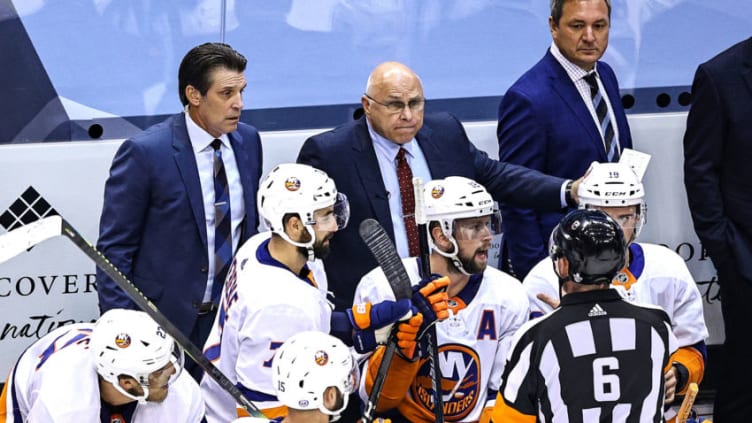Islanders: Disccussing two officiating controversies from Game 5

The biggest talking points from the New York Islanders 4-3 OT loss in Game 5 came courtesy of the referees.
After the New York Islanders dropped Game 5 to the Philadelphia Flyers in overtime, the post-game talk amongst Islanders fans centered around two officiating decisions that caused confusion and anger.
So let’s talk about those two calls, maybe that will allow us to move on. Or it’ll just make us mad all over again.
The first call in question was a Claude Giroux high stick that caught Islanders forward Mathew Barzal under the eye late in the third period. Barzal did not return to the ice for the rest of the third or for overtime.
The second came in overtime when Flyers goalie Carter Hart caught the puck while behind his net. A clear penalty. But instead of receiving the two-minute minor called for in the rule book, Hart got off with a warning.
Why?
Accidental
Late in the third period, Flyers captain Claude Giroux caught Mathew Barzal under the visor and under his eye with the tip of his blade. Barzal fell to the ice and left with a bloody gash. He didn’t return to the game.
You can see a video of the incident here.
It looks awful. Giroux even cringed when he saw a replay on the big screen. But the Flyers captain wasn’t given a penalty on the play. After all, Giroux’s stick caught Barzal high and Barzal was bleeding as a result of the play. Why did that not result in a double minor?
According to the NHL rule book, high sticking doesn’t result in a penalty if the incident is the result of a follow-through:
Rule 60.1: A “high stick” is one which is carried above the height of the opponent’s shoulders. Players must be in control and responsible for their stick. However, a player is permitted accidental contact on an opponent if the act is committed as a normal windup or follow through of a shooting motion
Some will argue that Giroux wasn’t shooting the puck so much as passing it, but the intent of the rule is that a follow-through can result in an accidental high stick and that is fine. Players shouldn’t let up on a play because they think it might strike another player up high.
For the record, I think that’s nonsense. Sticks shouldn’t hit anyone up high. But I can’t be mad at the refs on this one.
That’s a Penalty
Nine minutes into overtime, Andy Greene rims the puck around the glass in the Flyers end from outside the blueline to establish offensive zone pressure. But Carter Hart leaves his net to catch the puck off the glass. That’s a penalty.
You can see the incident here.
The NHL rule book is quite clear about this:
Rule 63.2 (Delay of Game): A minor penalty shall be imposed on any player, including the goalkeeper, who holds, freezes or plays the puck with his stick, skates or body in such a manner as to deliberately cause a stoppage of play. With regard to a goalkeeper, this rule applies outside of his goal crease area.
But rather than get a two-minute minor as the rule book states, Hart didn’t receive a penalty. Instead, he received a ‘talking to’ from official Chris Lee.
According to former NHL goalie Martin Biron, this penalty rarely gets called unless a warning has already been made.
The rule book calls for a penalty, but I’ve never seen this called without offering a warning first.
— Martin Biron (@martybiron43) September 2, 2020
I’m all for giving players second chances but unfortunately, that’s not how the sport is supposed to work. You break a rule, the other team gets a power play for it.
Mathew Barzal didn’t get a second chance when he played the puck in the penalty box as a rookie back in 2016-17. No, he got an interference penalty as the rules indicate.
Want your voice heard? Join the Eyes On Isles team!
Remember, that incident for Barzal came five minutes into the first NHL game of his career. If Barzal isn’t owed a ‘talking to’ then nor is Carter Hart owed one nine minutes into overtime in an elimination game in his 86th career NHL game (regular season and playoffs). Regardless of the inexplicable NHL convention of “this penalty always gets a warning”.